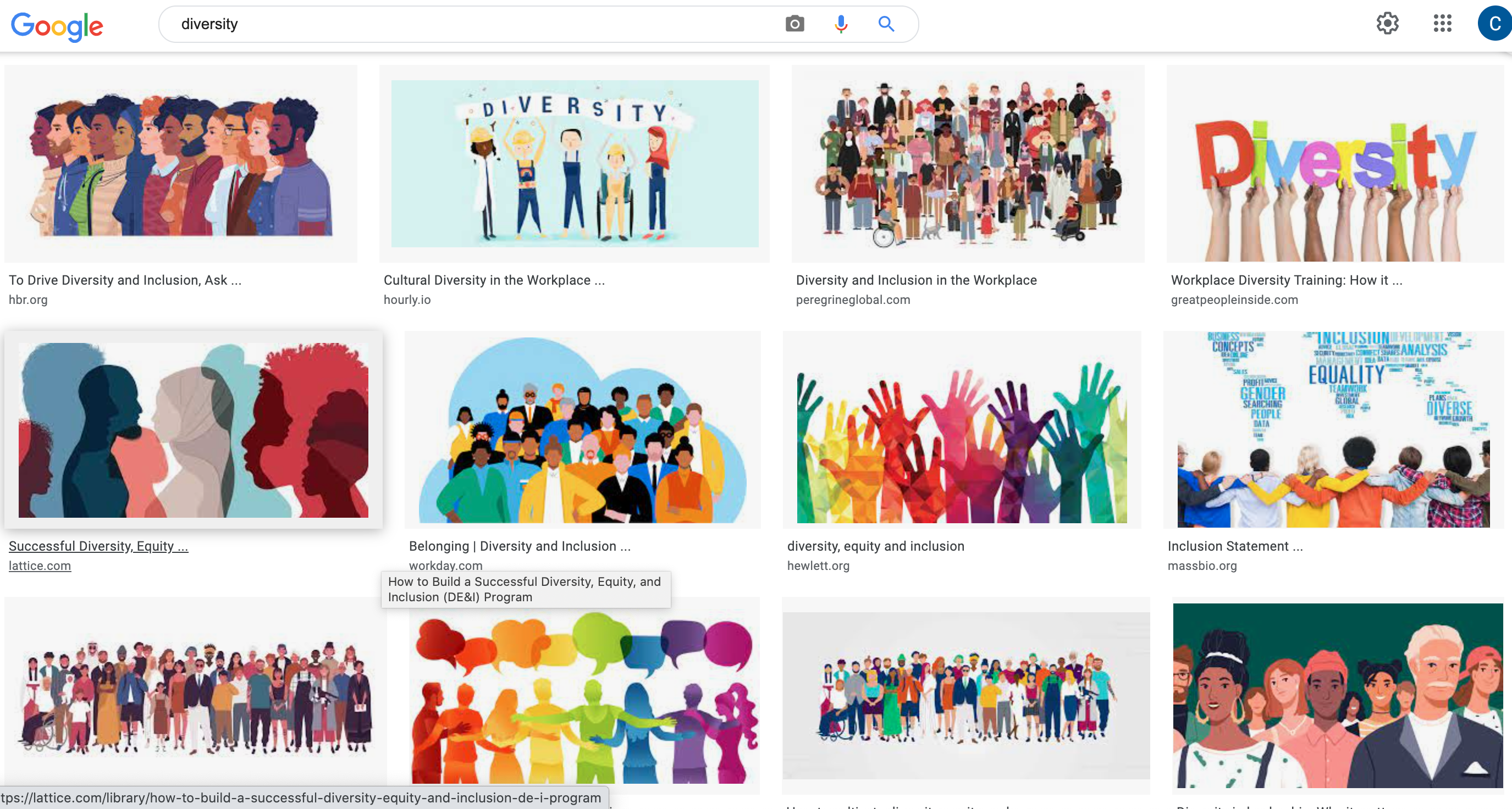
When I did a Google image search for the word diversity, the top twelve images (above) all showed people with different color skin. I was thinking about the idea of diversity for a different reason.
When I first got to Hotchkiss, twenty-five years ago, the school assigned my newlywed husband and me a couple of personal mentors. (Hi, B and MA!) Their assignment was to help us integrate into the community and the area. They told us about the different grocery store options, the local dentists, etc. Once I started working here two years after we moved onto campus, I ended up spending consecutive fall seasons coaching water polo with each of them. Spending hours together on deck gives people a lot of time to talk, and I will never forget some of the advice that one of them gave me about running. I was still in my twenties and believed my muscles, bones, and joints were invincible, but she said to me that while she loved to jog, she never ran two days in a row and therefore never got injured. Since then, I've kept my running to thrice weekly and found other exercises for the remaining days. While it's not true that I've never suffered from injury, it's mostly true. Thanks for the good advice!
Recently, went on a jog using the Peloton outdoor programming to have Adrian Williams (one of my favorite instructors) tell me when to speed up. At one point, he said that once he diversified his training, his running got much faster. While I'm not fast and don't aspire to speed, I do agree that my other workouts (strength training, biking, and yoga, mostly) help me be a better, healthier runner. His instructions got me thinking about all of the ways that diversifying our lives in areas outside of exercise can help us.
- To keep one's investments safe from market volatility, it's important to spread out the kinds of places we put our money. No professional would recommend a portfolio of all one kind of stock would or of only stock.
- To stay healthy, we need to eat a variety of foods. A person who ate one type of food, even if it were something super healthy such as broccoli, would miss out on essential nutrients.
- If we read books in only one genre, we miss out on understanding more kinds of people, learning more techniques, seeing where words can bring us.
- And, as the images in my search advertise, if we hang out with people who all look, act, or think the same, we lose.
I'm sure there are other ways diversity helps us become stronger, safer, smarter, and better, so I wonder why, when given the chance, so many of us try to surround ourselves with people who are just like us. If we want to make the best decisions, we shouldn't comprise our committees of people who come up with the same ideas as we do, but with people who see the world differently. I'm certainly talking about people who come from different ethnicities, but not only that. We should surround ourselves with people of diverse diversities as far as race, religion, political orientation, gender identity, sexuality, socioeconomic status, ability, age, hometown, taste, etc. The broader, the better.
Have you found ways to diversity your life that have led you down better paths? Please share any ideas in the comments.
Good advice, Carita.
Thanks. I’m still looking for more aspects of my life to diversify, so if you think of any I could add, please let me know.
Diversity can help improve decisions, enrich a life, etc. Too much diversity, in ways the members can’t readily manage, can break down a system, entropy. “So much of economics is about marginal changes,” Dr. Boushey said (brelow). Enough “small” changes and sometimes systematic structural transformations occur. Whether those systematic structural transformations are “good” or not depend on whose perspective. Eg, slowly adding authoritarian-oriented members to local government decision bodies. Initially appearing to increase diversity, until a tipping point is passed. But that could also be seen as a non-linear process
– – – – –
Heather Boushey, a member of the White House’s Council of Economic Advisers who handles climate issues, says the field is learning that simply tinkering with prices won’t be enough as the climate nears catastrophic tipping points, like the evaporation of rivers, choking off whole regions and setting off a cascade of economic effects.
“So much of economics is about marginal changes,” Dr. Boushey said. “With climate, that no longer makes sense, because you have these systemic risks.” She sees her current assignment as similar to her previous work, running a think tank focused on inequality: “It profoundly alters the way people think about economics.”
– Lydia DePillis, NY Times, B1, 25Aug2022.
What a thoughtful comment. I hadn’t thought about the chaos that can ensue when things diversify quickly and/or without a plan. Thanks, Daniel.
Apropos of your post.l, I finished reading Andrew Solomon’s book Far From the Tree. I highly recommend it and wish I had read it when it first came out.
I don’t know the book. I’ll add it to my (very long) TBR.